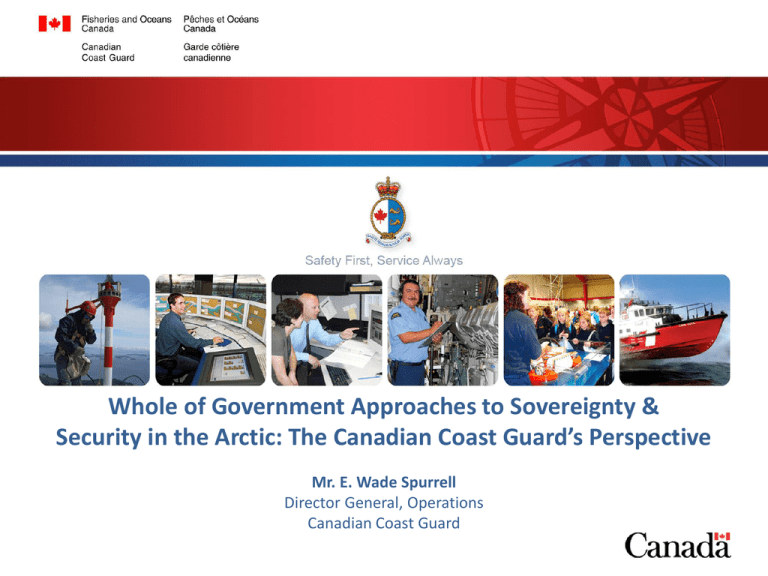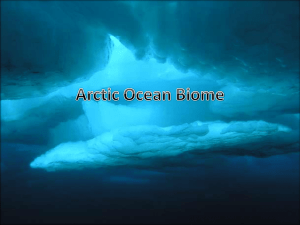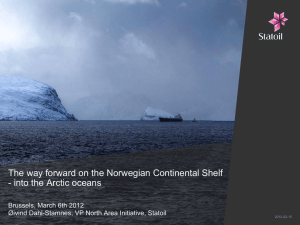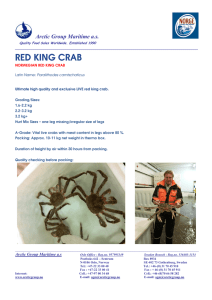Whole of Government Approaches to Sovereignty & Security
advertisement

Whole of Government Approaches to Sovereignty & Security in the Arctic: The Canadian Coast Guard’s Perspective Mr. E. Wade Spurrell Director General, Operations Canadian Coast Guard 1 Whole-of-Government Approach to Arctic Sovereignty & Security • As Canada’s civilian fleet, Canadian Coast Guard (CCG) vessels, systems and personnel are relied on to help fulfill safety, security, defence and environmental protection priorities in the Arctic. • Canada’s whole-of-government approach to Arctic Sovereignty and Security aligns with the horizontal, collaborative approach to maritime security used for all Canadian waters and approaches. • CCG is a core member of Canada’s maritime security community and collaborates with partners through a variety of fora to advance Arctic objectives: – – – – Interdepartmental Marine Security Working Group (IMSWG); Arctic Security Working Group / Northern Interdepartmental Intelligence Working Group; North Atlantic Coast Guard forum; and Canada-U.S. Maritime Stakeholders’ Conference. 2 Coast Guard’s Contribution to Arctic Sovereignty & Security • Delivery of essential maritime services in northern waters: – Icebreaking, community re-supply, aids to navigation, SAR and Environmental Response capacity, Maritime Domain Awareness (MDA), support to partners’ Arctic priorities (e.g. science, hydrographic charting, fisheries enforcement, maritime security). – Demonstrates Canada’s ability to exert influence and maintain safety and security within its sovereign territory. • Arctic Icebreaker Fleet: – Provides a visible Government of Canada presence in northern waters. – Leveraged by security and law enforcement partners for on-water response efforts, as needed. – Participates in northern security and sovereignty exercises, such as Operation Nanook. • Vessel Traffic Management: – Collects and maintains vessel information on traffic within and approaching Canada’s northern waters. – NORDREG reporting via CCG’s Marine Communications and Traffic Services. – Leveraged by federal partners to support Arctic MDA. 3 Marine Security Operations Centres • Marine Security Operations Centres (MSOCs) exemplify the collaborative, horizontal approach to advancing maritime security priorities throughout Canadian waters, including the Arctic. • MSOCs see the co-location and collaboration of five federal partners (DND, RCMP, TC, CBSA and DFO/CCG) to monitor Canadian water and approaches, in order to detect and assess maritime security threats and support MDA overall. • CCG Participation: – Personnel, expertise, vessel tracking and analysis capabilities are leveraged to support threat identification and assessment. – Long-Range Identification and Tracking (LRIT), Automatic Identification and Tracking (AIS), Information System on Marine Navigation (INNAV). • MSOCs and the Arctic: – MSOCs provides Canada’s most comprehensive awareness of the Arctic maritime domain. – Daily sailing plans and position reports for vessels and Arctic Adventurers during the Arctic shipping season. – Tracking of specific Vessels of Interest. 4 Arctic Maritime Domain Awareness Assessment • Arctic MDA is a whole-of-government priority: – Helps advance Canada’s objectives across a range of missions. – Requires inter-agency collaboration and leveraging of departments’ individual capabilities and expertise. • The Arctic MDA Assessment is an interdepartmental initiative to identify and assess Canada’s MDA capabilities for northern waters. – CCG-led, with broad federal engagement (e.g. DND, TC, EC, AANDC, CSA, RCMP, CBSA) – A priority of Canada’s Interdepartmental Marine Security Working Group (IMSWG) • The goal of the Assessment is twofold: – To develop a thorough understanding of Canada’s ability to identify, assess and support responses to, potential maritime threats in the Arctic; and – To determine potential ways to enhance Arctic MDA. • Results are intended to support maritime security efforts in Arctic waters, and inform decisions on the deployment and development of MDA capacity there. 5 Northern Marine Transportation Corridors • Marine transportation is a key enabler for economic and community development in the North. • Corridors are shipping routes and/or areas within which key navigational information and services, such as icebreaking and aids to navigation, should be focused. The concept of corridors would serve as a pragmatic approach to Arctic investments. • CCG, Canadian Hydrographic Service (CHS) and Transport Canada (TC) are currently exploring a concept to address this challenge: Northern Marine Transportation Corridors. • CCG, CHS and TC are in the process of engaging and validating the corridors approach with key stakeholders. 6








